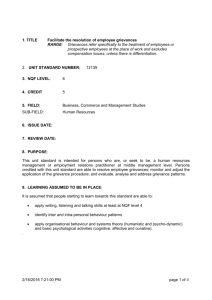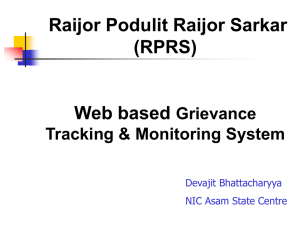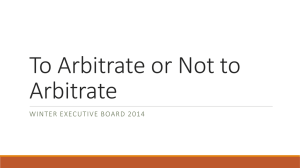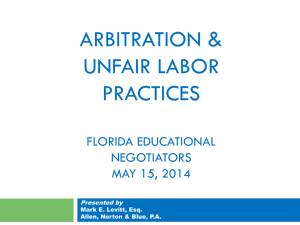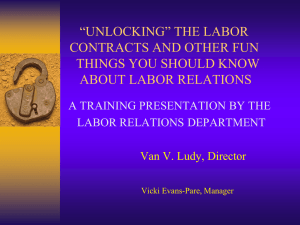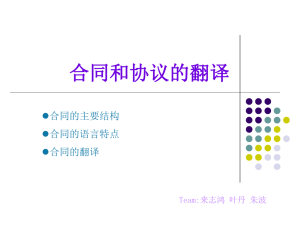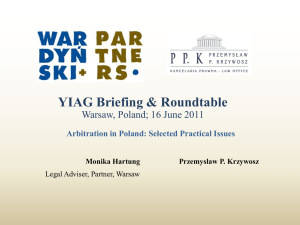Mgmt 583 Chapter 14 Contract Adminstration
advertisement
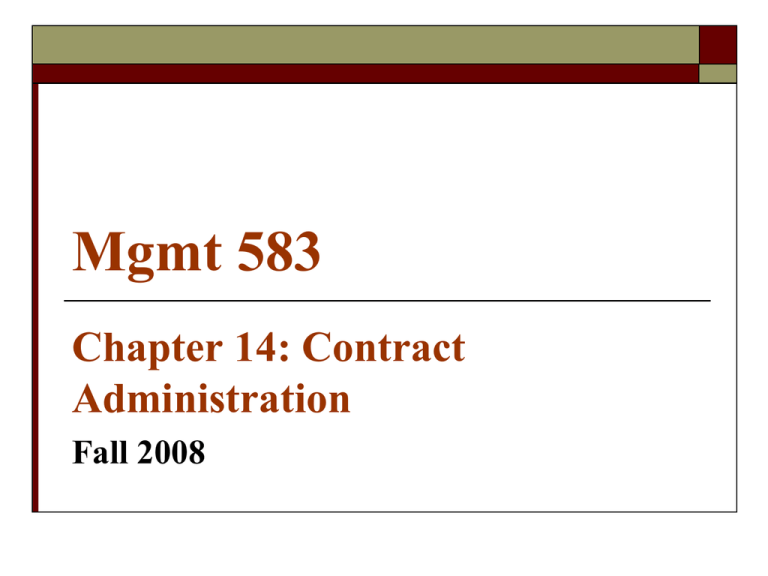
Mgmt 583 Chapter 14: Contract Administration Fall 2008 Contract Administration Contract Administration Contains provisions for handling grievances (how disagreements over the contract’s interpretation will be resolved). Establishes procedures for filing a grievance. Time frames Points of contact Requirements for formalization Contract Administration Contract Administration May establish procedures for taking issues to rights arbitration. Which issues may be grieved. Limitations on the arbitrator’s powers. Who pays for the arbitration. Grievances Grievance - any violation of the the collective bargaining agreement. Interpretation of the CBA. Unilateral modification of the CBA. Refusal to abide by its provisions Grievances Sources of Grievances Discipline Pay Working Conditions Job Assignments 18% 17% 16% 16% Typical Grievance Process First Step Employee Through the Shop Steward Discuss Grievance Supervisor Resolved Unresolved Reduced to writing and answered by Mgmt in 5 days Appeal in 5 days of Receipt Typical Grievance Process Second Step Union Grievance Committee Discuss Grievance IR Rep. Resolved Unresolved Management answers in 5 days Appeal in 5 days of Receipt Typical Grievance Process Third Step Union Grievance Committee Discuss Grievance Plant Manager Resolved Unresolved Management answers in 10 days Appeal within 30 days of Receipt Typical Grievance Process Fourth Step Rights Arbitration Final & Binding Decision Grievances Three Methods of Resolving Grievances: Arbitration Strikes Mediation Grievances Unions duty to fair representation on grievances. Miranda Fuel Co. (51 LRRM 1584 (1962)) the employee’s right to engage in collective bargaining includes the right to be represented by the exclusive bargaining representative. The union must represent all members of the BU fairly. Grievances Unions duty to fair representation on grievances. Ford Motor Co. v. Huffman (345 U.S. 330 (1953)) the union is obligated to process all meritorious grievances without discrimination or else it violates §§ 8 (b)(1)(A) and 8(b)(2). If the facts are clear and show a breach of the CBA, the union cannot ignore the member’s rights. Grievances Unions duty to fair representation on grievances. If the facts are unclear the union has a wide range of reasonableness in resolving the ambiguity. In performing the mechanical functions of processing the grievance, the union is held to a standard of at least ordinary care. Rights Arbitration History Executive Order 9017 provided for rights arbitration during WWII. Purpose was to reduce interruptions in war time production. Without arbitration, only mediation, strikes, and lockouts could resolve grievances. Textile Workers Union v. Lincoln Mills (353 U.S. 448 (1957)) Supreme Court rules that arbitration awards are enforceable. Rights Arbitration Arbitration - a quasi-judicial process in which parties agree to submit an unresolved dispute to neutral third-party binding settlement. Rights Arbitration - arises over interpretation of the CBA’s meaning or entitlement to its provisions (post CBA ratification). Interest Arbitration - during CBA negotiations.

